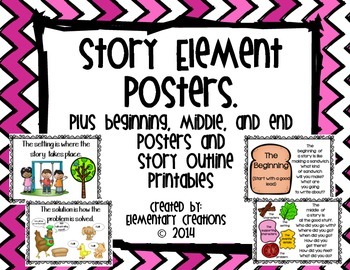
They help to “cue students to story elements to expect” before reading, “help students monitor their comprehension and keep track of the action in a story” during reading, and after reading, graphic organizers “require students to reflect on what they read and make connections between story elements.” (pg. I like what Emily Kissner says in her book, Summarizing, Paraphrasing, and Retelling, about story maps and graphic organizers. Knowing what kind of structure a text will have helps readers to organize and summarize the important information.
#Story element chart free
Here are some FREE graphic organizers to help young readers look for the important information in a fiction work. To describe main idea, I’ve used these phrases: “What is the story all about?” or “If you could tell me what the story was about in 2-3 sentences, what would you say?” For a more in-depth study on these story elements, click here. When I’m faced with texts such as these, many times, I’ll ask kids to tell what happened first, next, and last then tell me what the main idea of the story is. Sometimes the plot is not organized and packaged so neatly. *Not all fiction works include all of these elements.

Problem or Conflict: usually introduced early on can be external or internal.Setting: when and where did the story take place.Characters: main characters & supporting characters.It also spills over nicely into helping them write their own fictional stories. Studying the story elements and structure of fiction is an important way to deepen your child’s reading comprehension because it helps them understand what is important.


 0 kommentar(er)
0 kommentar(er)
